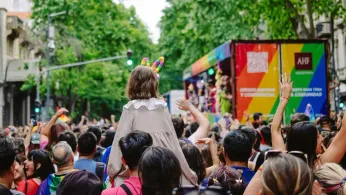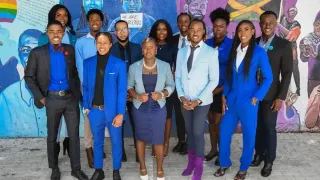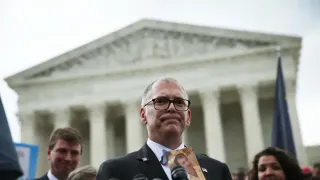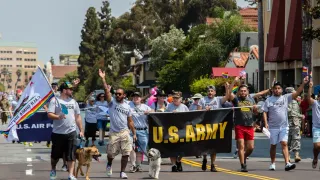
4 hours ago
Thousands Rally for LGBTQ+ Rights at Buenos Aires Pride Amid Rising Hate Crimes
READ TIME: 3 MIN.
On Saturday, November 1, 2025, Buenos Aires witnessed its 34th annual Pride Parade, a gathering that brought together thousands of LGBTQ+ Argentines, allies, families, and tourists. The event, a staple of Argentina’s queer calendar, was marked not only by its festive atmosphere—complete with music, dance, and colorful costumes—but also by a spirit of resistance. Marchers rallied under the slogan “Against hate and violence: more pride and unity,” highlighting their demand for safety, equality, and respect in a climate increasingly hostile to LGBTQ+ rights .
As participants moved from Plaza de Mayo to the National Congress building, the parade became a visible statement against recent governmental policies and rhetoric perceived as discriminatory by many in the community. The event’s dual character—as both celebration and protest—reflected the precarious situation facing queer Argentines in 2025 .
The parade’s urgency was underscored by sobering statistics: hate crimes against LGBTQ+ people in Argentina have surged by 70% in the first half of 2025 compared to the previous year, according to the Observatorio Nacional de Crímenes de Odio LGBT+ . The majority of victims were transgender women , with gay men , lesbians , transgender men , and non-binary people also targeted .
This rise in violence comes amid a broader societal shift to the right. Since President Javier Milei’s inauguration, the administration has drawn criticism from human rights groups for policies and remarks that many see as undermining the safety and dignity of LGBTQ+ people. Earlier in the year, President Milei’s comments at the World Economic Forum in Davos—denouncing “radical feminism” and “gender ideology” as a “cancer that must be extirpated”—galvanized activists and fueled further protests .
The Buenos Aires Pride Parade was not only a local event but also an international moment. Global attention was heightened when pop star Dua Lipa, in the city for a concert, sent a message of support that was broadcast from one of the event’s stages: “Today I want to celebrate with you and send you all my love and support on this very special day” .
The event featured a blend of political demonstration and cultural celebration. Protestors carried rainbow flags, danced, and participated in performances that underscored the resilience and diversity of Argentina’s LGBTQ+ community. The parade’s route, from Plaza de Mayo to the National Congress, mirrored historic marches for human rights in the country, reinforcing the connection between LGBTQ+ rights and Argentina’s broader democratic traditions .
Argentina’s midterm elections and ongoing economic crisis have intensified the stakes for marginalized communities. In October, a $20 billion bailout from the United States was made contingent on President Milei’s electoral success and economic reforms, further cementing the influence of conservative politics in the country .
Critics argue that the government’s rightward shift has emboldened anti-LGBTQ+ actors, undermined protections, and contributed to an atmosphere where hate crimes can flourish. Civil society organizations have responded by increasing their visibility and advocacy, using Pride as a platform to demand legislative action and public education campaigns to combat discrimination .
Activists and parade organizers emphasized that, despite increasing challenges, the LGBTQ+ community remains united and determined. “This year’s Pride is not just a celebration—it’s a necessary act of resistance,” one organizer told GO Magazine .
LGBTQ+ organizations in Argentina are calling for:
- Stronger enforcement of anti-discrimination laws
- Greater access to mental health and social support services for victims of hate crimes
- Comprehensive education on gender and sexual diversity in schools
International human rights groups have echoed these demands, urging the Argentine government to fulfill its obligations under international law to protect all citizens, regardless of sexual orientation or gender identity .
The 34th Buenos Aires Pride Parade stands as a testament to the resilience of Argentina’s LGBTQ+ community in the face of adversity. While the rising tide of hate crimes and anti-LGBTQ+ rhetoric signals grave challenges, the outpouring of support and solidarity on November 1 sent a clear message: Pride endures, even in the most difficult times. As Argentina navigates its political and economic uncertainties, the voices raised at Pride—demanding dignity, safety, and equality—will remain a vital force for change .






